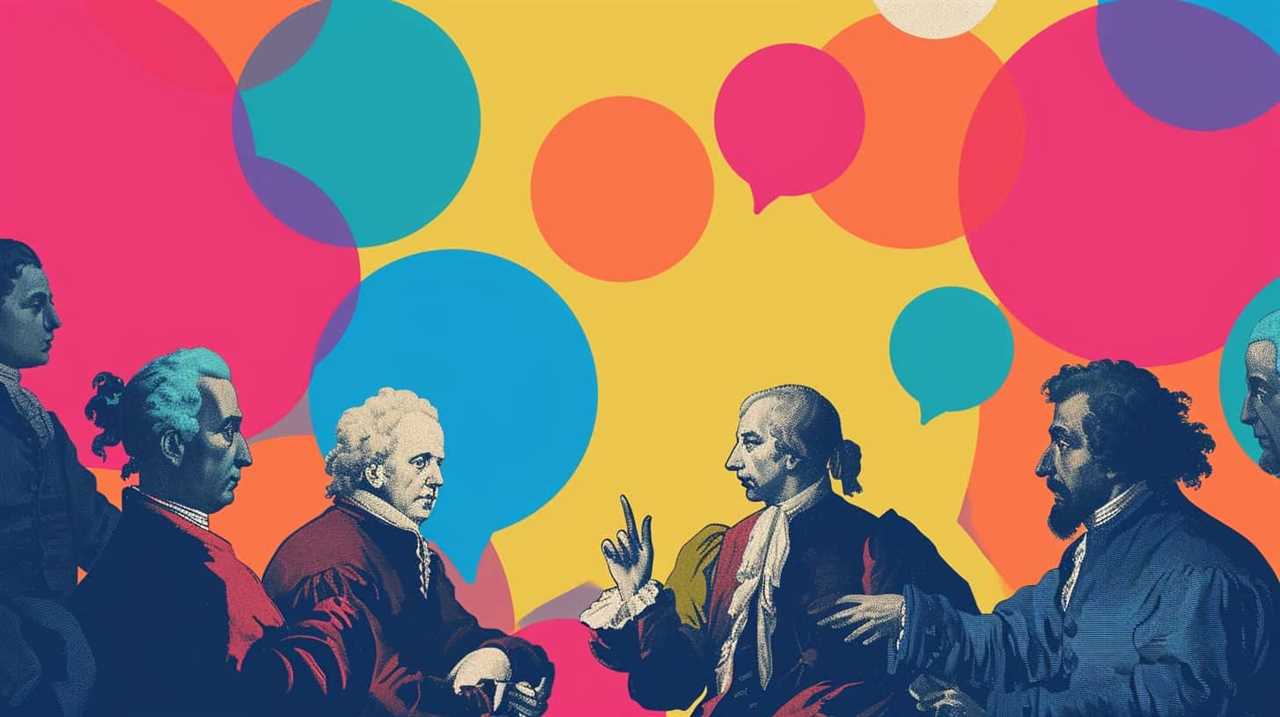Delve into the intriguing world of ethics and uncover the profound wisdom shared by utilitarian philosophers. Their principles act as a beacon of light, leading us on a journey towards a lifestyle centered around helping those around us. Curious minds seeking deeper ethical understanding will find inspiration in these enlightening concepts. Continue to discover the transformative power of prioritizing the well-being of others.
Jeremy Bentham and John Stuart Mill, two prominent proponents of utilitarianism, present valuable perspectives on ethical decision-making. Through their principle of utility, they advocate for actions that maximize happiness and minimize suffering for the greatest number of people. They emphasize the importance of moral responsibility, intention, justice, fairness, and impartiality in our ethical considerations.
Today, their utilitarian approach continues to find relevance in various contemporary contexts. Join us as we delve into the profound insights from these thinkers, and discover how their philosophy can inspire us to make ethical choices that prioritize the well-being of all.
Key Takeaways
- Utilitarian thinkers such as Jeremy Bentham and John Stuart Mill emphasize maximizing overall happiness and minimizing suffering.
- The principle of utility states that the right action is the one that maximizes overall happiness or well-being, considering the potential consequences.
- Utilitarian ethics aims to maximize overall happiness and minimize suffering for the largest number of people, prioritizing the well-being of a larger population.
- Utilitarianism finds relevance in various fields such as healthcare ethics, environmental ethics, and public policy evaluation, providing a framework for making ethical choices that prioritize the well-being of all.

Jeremy Bentham’s Perspective on Ethics
In our exploration of utilitarian thinkers’ insights on ethics, we delve into Jeremy Bentham’s perspective, shedding light on his approach to moral principles. Jeremy Bentham was a prominent philosopher and the founder of utilitarianism, a theory that emphasizes the greatest happiness for the greatest number of people. Bentham believed that moral values are determined by the consequences of our actions and that the ultimate goal of ethics should be to maximize happiness and minimize suffering.
Utilitarianism, as espoused by Bentham, posits that moral values are intimately connected to the overall happiness and well-being of individuals. According to this perspective, an action is morally right if it leads to the greatest amount of happiness for the greatest number of people. Bentham argued that moral principles should be based on the principle of utility, which means that actions should be evaluated based on their utility or usefulness in promoting happiness and reducing suffering.
Bentham’s philosophy has had a profound impact on modern ethics. His emphasis on the pursuit of happiness and the well-being of individuals has influenced various fields, including law, politics, and social policy. The utilitarian approach to moral values has been applied in areas such as healthcare ethics, environmental ethics, and the evaluation of public policies. Bentham’s philosophy has also contributed to the development of consequentialist ethical theories, which focus on the outcomes or consequences of actions rather than on the intentions or motives behind them.

John Stuart Mill’s Contribution to Utilitarian Ethics
Continuing our exploration of utilitarian thinkers’ insights on ethics, let’s now delve into John Stuart Mill’s significant contribution to utilitarian ethics. Mill’s influence on utilitarianism in modern society can’t be overstated. He expanded upon the ideas of his predecessor Jeremy Bentham, adding depth and nuance to the philosophy.
One of Mill’s most important contributions was the concept of higher and lower pleasures. He argued that not all pleasures are equal, and that some are of greater value than others. According to Mill, intellectual and moral pleasures, such as the pursuit of knowledge or the practice of virtue, are superior to physical pleasures. This distinction has profound implications for ethical decision-making, as it encourages individuals to prioritize the well-being of their minds and souls over mere physical gratification.
Mill also emphasized the importance of individual liberty in utilitarian ethics. He believed that society should strive to maximize the overall happiness of its members, but not at the expense of individual freedom. This idea is particularly relevant in the context of modern society, where issues of personal autonomy and freedom of choice are hotly debated.
Furthermore, Mill recognized the limitations of purely quantitative measures of utility. While Bentham focused on maximizing pleasure and minimizing pain, Mill acknowledged the complexity of human experiences and introduced the concept of qualitative utilitarianism. He argued that the quality of pleasure should be taken into consideration, alongside its quantity, when making ethical judgments.

The Principle of Utility in Ethical Decision-Making
As we delve into the subtopic of ethical decision-making, it’s important to understand the principle of utility. The principle of utility, also known as the greatest happiness principle, is a key concept in ethical decision-making. It’s based on the idea that the right action is the one that maximizes overall happiness or well-being for the greatest number of people.
In ethical decision-making, the principle of utility requires us to consider the potential consequences of our actions and choose the course of action that will result in the greatest overall happiness. This means taking into account the interests and well-being of all those affected by our decisions, not just our own self-interest.
When faced with ethical dilemmas, the principle of utility offers a framework for making decisions that prioritize the well-being of others. It encourages us to consider the long-term impact of our actions and to weigh the potential benefits and harms to different individuals or groups.
However, it’s important to note that the principle of utility doesn’t advocate for blindly maximizing happiness at the expense of other moral considerations. It recognizes that there may be situations where other ethical principles or values need to be taken into account.

The Concept of the Greatest Happiness for the Greatest Number
To better understand the concept of the greatest happiness for the greatest number, we must delve into the insights of utilitarian thinkers on ethics. In utilitarian ethics, the goal is to maximize overall happiness and minimize suffering for the largest number of people. This concept is based on the belief that the right action is the one that leads to the greatest overall happiness.
One of the key challenges in implementing the concept of the greatest happiness for the greatest number is the quantification of happiness. Utilitarian thinkers acknowledge that happiness is subjective and difficult to measure. While there are various metrics and scales that attempt to quantify happiness, they can only provide a limited understanding of individual and collective well-being. The ethical implications of relying solely on happiness metrics are also complex. Prioritizing the happiness of the majority may overlook the needs and interests of minority groups or individuals.
Another challenge lies in the fact that happiness isn’t the only factor to consider when making ethical decisions. Utilitarian ethics often overlook other important aspects, such as justice, fairness, and individual rights. Critics argue that focusing solely on happiness can lead to unjust outcomes and undermine important moral principles.

Utilitarian Approach to Moral Responsibility
One important aspect of the utilitarian approach to ethics is our moral responsibility. As utilitarians, we believe that our moral decision making should be guided by the principle of maximizing overall happiness or utility. This means that we’ve ethical obligations to consider the consequences of our actions and strive to promote the greatest happiness for the greatest number of people.
To better understand the utilitarian approach to moral responsibility, let’s consider the following:
- Consequentialism: Utilitarians focus on the outcomes or consequences of our actions. We’re responsible for the results of our choices and should aim to produce the greatest overall happiness.
- Cost-benefit analysis: Utilitarians engage in a practical assessment of the costs and benefits associated with our actions. We’ve a responsibility to weigh the potential harms and benefits to determine the morally right course of action.
- Impartiality: Utilitarians believe in treating all individuals equally. We’ve a responsibility to consider the well-being of everyone affected by our actions and make decisions that promote the greatest overall happiness, regardless of personal biases or preferences.
- Long-term perspective: Utilitarians take into account the long-term consequences of our actions. We’ve a responsibility to consider the potential future effects of our decisions and act in a way that promotes sustainable and lasting happiness.
- Collective responsibility: Utilitarians recognize that we’re part of a larger society and have a responsibility to contribute to the overall well-being of the community. We’ve ethical obligations not only towards ourselves but also towards others, and we should act in a way that benefits the collective good.
In summary, the utilitarian approach to moral responsibility emphasizes the importance of considering the consequences of our actions and making decisions that promote the greatest overall happiness. By adhering to these ethical obligations, we can strive to create a more just and compassionate society.
Now, let’s explore the next section about balancing individual rights and the collective good.

Balancing Individual Rights and the Collective Good
In the utilitarian approach to ethics, we must carefully balance individual rights with the collective good. This requires us to navigate ethical dilemmas and make decisions that consider the well-being of both individuals and society as a whole. The ethical decision-making process becomes crucial in finding the right balance between individual rights and the collective good.
When faced with ethical dilemmas, individuals often find themselves torn between protecting the rights and interests of individuals or promoting the greater good for society. Utilitarian thinkers argue that the collective good should be prioritized over individual rights, as long as the overall happiness and well-being of the majority are maximized. This means that in certain situations, individual rights may need to be limited or even sacrificed for the greater benefit of society.
However, striking a balance between individual rights and the collective good isn’t a straightforward task. It requires careful consideration of the potential consequences of our actions and the impact they’ll have on both individuals and society. Utilitarian thinkers emphasize the importance of weighing the potential benefits and harms of different courses of action and choosing the one that maximizes overall happiness and well-being.
The ethical decision-making process, in this context, involves evaluating the potential consequences of different actions and considering the rights and interests of all individuals involved. It requires us to take into account the perspectives and needs of different stakeholders and to find the best possible solution that promotes the greatest overall happiness and well-being.

Ethical Implications of Maximizing Overall Well-Being
Balancing individual rights with the collective good requires carefully considering the ethical implications of maximizing overall well-being. When making ethical decisions, it’s essential to evaluate the potential impact on the overall well-being of all individuals involved. This approach prioritizes the welfare of the majority and aims to create the greatest amount of happiness or utility for the greatest number of people.
Here are five key ethical implications of maximizing overall well-being:
- Consequentialism: Maximizing overall well-being aligns with the consequentialist approach to ethics, which focuses on the outcomes or consequences of actions. By considering the overall well-being of individuals, ethical decision-making becomes centered on creating positive outcomes and minimizing harm.
- Utilitarianism: The ethical theory of utilitarianism emphasizes the importance of maximizing overall well-being. Utilitarians believe that actions should be evaluated based on their ability to produce the greatest amount of happiness or pleasure for the greatest number of people.
- Fairness and Justice: Maximizing overall well-being requires a fair and just distribution of resources and opportunities. Ethical decision-making should consider the equitable allocation of resources to ensure that everyone has an equal chance to thrive and experience well-being.
- Long-term Sustainability: Maximizing overall well-being involves considering the long-term sustainability of actions and decisions. This includes taking into account the impact on future generations and the environment, as well as promoting practices that contribute to the long-term well-being of society as a whole.
- Ethical Dilemmas: Maximizing overall well-being can present ethical dilemmas when individual rights or interests conflict with the collective good. Ethical decision-making in such situations requires careful consideration of the potential consequences and trade-offs involved, aiming to find a balance that maximizes overall well-being while respecting individual rights.

The Role of Consequences in Utilitarian Ethics
Considering the consequences is essential in understanding the role of utilitarian ethics. Utilitarian thinkers believe that the morality of an action should be determined by the overall consequences it produces. This means that the ethical implications of an action are assessed based on the outcome it generates, rather than the intention behind it.
To illustrate the importance of consequences in utilitarian ethics, let’s examine the following table:
| Action | Intention | Consequences |
|---|---|---|
| Donating | Altruistic | Improved well-being of others |
| Stealing | Selfish | Harm to the victim |
| Telling lies | Protective | Trust erosion |
In this table, we can see that different actions have different intentions and consequences. Utilitarian thinkers argue that the ethical implications of these actions should be judged based on the overall well-being they produce.
The role of intention is not completely disregarded in utilitarian ethics. While consequences are prioritized, the intention behind an action can influence the perceived moral worth of an individual. For example, donating with the intention of helping others is seen as more morally praiseworthy than stealing with selfish intentions.
However, utilitarian thinkers emphasize that intention alone is not sufficient to determine the ethical value of an action. The ultimate focus should be on the consequences it generates, as these consequences have a direct impact on the overall well-being of individuals.

Criticisms of Utilitarianism in Ethical Philosophy
While utilitarian thinkers emphasize the importance of considering the consequences of our actions, criticisms of utilitarianism in ethical philosophy have pointed out several limitations in this approach. These criticisms shed light on the potential flaws and challenges that arise when applying utilitarian principles to ethical decision-making. Here are some of the key criticisms and limitations of utilitarianism:
- Lack of Individual Rights: One of the main criticisms of utilitarianism is that it often overlooks the importance of individual rights and liberties. Critics argue that utilitarianism’s focus on maximizing overall happiness or pleasure can lead to the sacrifice of individual rights and the violation of ethical principles.
- Subjectivity of Measuring Happiness: Determining the overall happiness or pleasure resulting from an action is subjective and can vary from person to person. Critics argue that this subjectivity makes it difficult to accurately measure and compare the consequences of different actions, undermining the objectivity of utilitarianism.
- Ignoring Justice and Fairness: Utilitarianism’s emphasis on maximizing overall happiness can sometimes overlook considerations of justice and fairness. Critics argue that this approach may justify actions that are unjust or unfair to certain individuals or groups.
- Lack of Moral Constraints: Utilitarianism’s sole focus on maximizing overall happiness can lead to a lack of moral constraints on actions. Critics argue that this can result in the justification of morally questionable actions if they ultimately lead to greater happiness or pleasure.
- Inability to Account for Long-Term Consequences: Utilitarianism’s focus on immediate consequences may neglect the potential long-term effects of an action. Critics argue that this limitation can lead to unintended negative consequences in the future.
Understanding these criticisms and limitations is essential for a comprehensive evaluation of utilitarianism as an ethical framework. By recognizing these challenges, individuals can engage in more nuanced ethical discussions and consider alternative perspectives that address these limitations.

Utilitarianism and the Role of Intention in Ethics
Utilitarian thinkers emphasize the significant role of intention in ethical decision-making, recognizing that the motives behind our actions greatly impact their moral value. The role of motivation in the ethical decision-making process is crucial for utilitarianism, as it focuses on maximizing overall happiness or utility. According to utilitarian thought, an action is deemed morally right if it produces the greatest amount of happiness for the greatest number of people. However, the intention behind the action also plays a critical role in determining its moral value.
In utilitarian ethics, the motive or intention behind an action is seen as an important factor in evaluating its moral worth. A morally right action isn’t solely determined by its consequences but also by the intentions of the agent. For example, if someone donates money to a charitable cause solely to gain recognition and praise, their action may not be considered morally praiseworthy according to utilitarianism. On the other hand, if the same person donates money with the genuine intention of alleviating suffering and promoting well-being, their action would be seen as morally commendable.
By considering the role of intention in ethical decision-making, utilitarian thinkers acknowledge that the motives behind our actions can greatly impact the overall happiness or well-being that’s produced. This perspective highlights the importance of cultivating virtuous intentions and ethical motivations, as they contribute to the overall utility or welfare of society.
Transitioning into the subsequent section on the utilitarian perspective on justice and fairness, it’s important to note that utilitarianism also takes into account the distribution of happiness and well-being. Utilitarian thinkers strive for the greatest happiness for the greatest number, which includes considerations of justice and fairness in the allocation of resources and benefits.

Utilitarian Perspective on Justice and Fairness
Building upon our understanding of the role of intention in ethical decision-making, we now delve into the utilitarian perspective on justice and fairness. Utilitarianism, as an ethical framework, emphasizes the greatest overall happiness for the greatest number of people. When it comes to justice and fairness, utilitarian thinkers focus on the outcomes and consequences of actions, rather than individual rights or principles. Here are some key insights from the utilitarian perspective on justice and fairness:
- Consequentialist approach: Utilitarianism takes a consequentialist approach to justice and fairness, prioritizing the outcomes and consequences of actions. The focus is on maximizing overall happiness and minimizing overall suffering.
- Distributive justice: Utilitarianism offers a unique perspective on distributive justice, suggesting that resources should be distributed in a way that maximizes overall happiness. This means that inequalities may be acceptable if they lead to a greater overall well-being for society.
- Equality vs. equity: While utilitarianism aims for the greatest overall happiness, it doesn’t necessarily advocate for strict equality. Instead, it considers the concept of equity, where resources are distributed based on the needs and abilities of individuals.
- Social inequalities: Utilitarianism recognizes that some level of social inequality may be necessary for the overall well-being of society. However, it also calls for a consideration of the least advantaged members of society to ensure that their basic needs are met.
- Utilitarian calculus: Utilitarian thinkers often employ a utilitarian calculus to assess the consequences of different actions and policies. This involves weighing the potential benefits and harms to determine the course of action that maximizes overall happiness.

The Importance of Impartiality in Utilitarian Ethics
Impartiality plays a crucial role in the ethical framework of utilitarianism, guiding our decision-making process towards the greatest overall happiness. As utilitarians, we believe that the right action is the one that maximizes overall happiness and minimizes overall suffering. In order to achieve this, we must set aside personal biases and preferences, and consider the well-being of all individuals affected by our actions.
However, while impartiality is essential in utilitarian ethics, it is not without its limits and challenges. One of the limits of impartiality is the difficulty in accurately predicting the consequences of our actions. We may strive to make decisions that will lead to the greatest overall happiness, but the complexity of human interactions and the uncertainty of outcomes can make it challenging to determine the best course of action.
Additionally, applying impartiality in ethical decision-making can be challenging due to our natural tendency to prioritize the interests of those closest to us or those we have emotional connections with. It can be difficult to detach ourselves from personal relationships and consider the well-being of strangers with the same level of importance.
To illustrate the challenges and limits of impartiality in utilitarian ethics, let us consider the following table:
| Limits of Impartiality | Challenges of Applying Impartiality |
|---|---|
| Difficulty in predicting consequences | Natural tendency to prioritize personal relationships |
| Uncertainty of outcomes | Emotional biases and attachments |
| Complexity of human interactions | Lack of complete information |

Contemporary Applications of Utilitarian Thinking in Ethics
In our modern society, the application of utilitarian principles in ethical decision-making has become increasingly prevalent. Utilitarianism, with its focus on maximizing overall happiness and minimizing harm, has found its way into various spheres, including healthcare and environmental ethics. Here are some contemporary applications of utilitarian thinking in ethics:
- Utilitarianism in modern healthcare: In the healthcare field, utilitarianism is often used to guide decisions regarding resource allocation and patient care. By considering the greatest good for the greatest number, healthcare professionals can prioritize treatments and interventions that will yield the most positive outcomes for patients and society as a whole.
- Utilitarianism in environmental ethics: Environmental ethics involves making decisions that balance human needs with the well-being of the natural world. Utilitarian thinking can be employed to analyze the consequences of various actions on the environment and determine the course of action that will result in the greatest overall benefit. This may involve weighing the potential impact on biodiversity, ecosystems, and future generations.
- Cost-benefit analysis: Utilitarianism can be applied to evaluate the costs and benefits of a particular action or policy. By assessing the potential positive and negative outcomes, decision-makers can determine whether the action is justified from a utilitarian perspective.
- Public policy formulation: Utilitarian principles can guide the development and implementation of public policies that aim to maximize overall welfare. This involves considering the potential consequences of policies on different groups in society and making choices that promote the greatest overall happiness.
- Ethical decision-making in business: Utilitarianism can be used to inform ethical decision-making in the business world. By considering the impacts of business practices on stakeholders and society as a whole, companies can make decisions that align with utilitarian principles and promote the greatest overall well-being.
Utilitarian thinking continues to play a significant role in shaping ethical decision-making in various domains, offering a framework for weighing the consequences of actions and striving for the greatest good for the greatest number.

Frequently Asked Questions
How Does Jeremy Bentham’s Perspective on Ethics Differ From John Stuart Mill’s?
Bentham and Mill’s contrasting perspectives on ethics stem from key differences in their utilitarian philosophies. While Bentham focused on maximizing pleasure, Mill emphasized the importance of higher-quality happiness in ethical decision making.
What Are the Ethical Implications of Maximizing Overall Well-Being?
Maximizing overall well-being has significant ethical implications, as it requires us to prioritize the greatest amount of happiness for the greatest number of people. This approach emphasizes serving others and making decisions that benefit society as a whole.
How Does the Utilitarian Approach Balance Individual Rights and the Collective Good?
In balancing individual rights and the collective good, the utilitarian approach seeks to maximize overall well-being. By weighing the consequences of actions, it aims to achieve the greatest happiness for the greatest number of people.
What Are Some Contemporary Applications of Utilitarian Thinking in Ethics?
Contemporary applications of utilitarian thinking in ethics include assessing the overall consequences of actions, such as in public policy decisions or resource allocation. However, criticisms and limitations exist regarding the measurement of utility and the potential disregard for individual rights.
How Does Utilitarianism Consider the Role of Intention in Ethical Decision-Making?
Utilitarianism, in considering the role of intention in ethical decision-making, evaluates actions based on their overall consequences and the greatest happiness for the greatest number of people. It prioritizes outcomes over individual intentions.

Conclusion
In conclusion, it’s clear that utilitarian thinkers offer valuable insights into ethical decision-making. Their emphasis on the greatest happiness for the greatest number and the principle of utility provides a pragmatic approach to morality.
However, their perspective on justice and fairness may be seen as overly simplistic, and the role of intention in ethics is a subject of debate.
Nevertheless, contemporary applications of utilitarian thinking continue to shape our understanding of ethical dilemmas in society.









